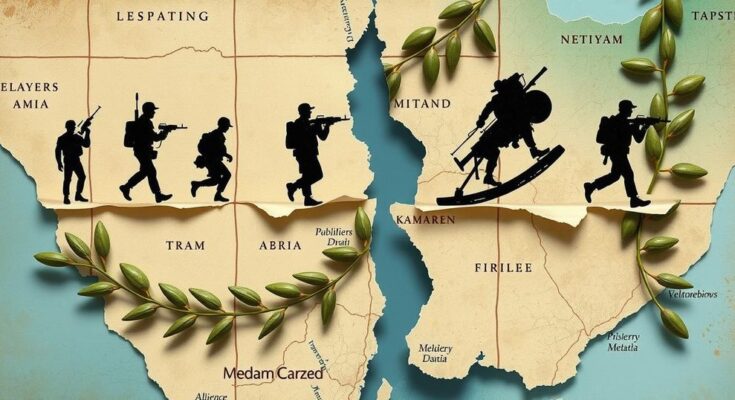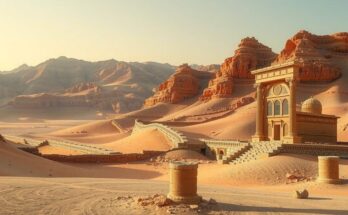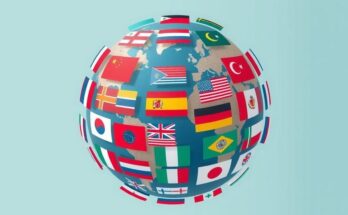Walid Jumblatt, a significant figure in Lebanese politics, critiques Israel’s aggressive actions as detrimental to the Arab world while emphasizing the need for Lebanon’s reconstruction and including Hezbollah in political discourse. He expresses cautious optimism towards Syria’s new leadership, advocating for their recognition. Jumblatt firmly states that lasting peace can only be achieved through addressing Palestinian rights amid ongoing regional tensions.
Walid Jumblatt, a prominent figure in Lebanese politics and leader of the Druze community, continues to wield significant influence despite stepping back from his formal role in the Progressive Socialist Party in 2023. He remains actively engaged during tumultuous times in the Middle East, characterized by regime change in Syria, escalating tensions between Iran and the United States, and a weakened Hezbollah. Jumblatt asserts that Israel’s aggressive policies pose a threat not only to Lebanon but to the entire Arab world, saying, “Israel has a free hand. It’s up to the Arabs to understand the dangerous policy of Israel that is planning to dislocate the whole of the Arab world.”
Jumblatt has witnessed profound changes throughout Middle Eastern history, notably during the Lebanese civil war which spanned from 1975 to 1990, a period particularly shaped by the assassination of his father, Kamal Jumblatt. Surviving numerous assassination attempts himself, he has seen Lebanon endure yet another devastation, this time due to the confrontation between Hezbollah and Israel. He noted that, “The Israelis have allowed themselves to attack any place in Lebanon, any place in Syria,” asserting their continued military presence and actions in the region despite a ceasefire agreement established in November.
Despite the ceasefire claiming to halt hostilities, conflict persists, with Israel maintaining military operations and occupying Lebanese territories. Jumblatt considers this ceasefire to be a mere façade, describing it as an “illusion” that fails to impose any meaningful restraints on Israel. Under the agreement, while Hezbollah is expected to withdraw from certain areas, the reality remains grim. He commended the Lebanese Army for their efforts amid significant challenges including the need for financial support.
Jumblatt expressed support for Lebanon’s new leadership and the need to rebuild, stating, “What is required of us, the Lebanese state, we are doing… We need foreign help, we don’t have enough resources here.” The financial toll of Israel’s military actions on Lebanon has been staggering, with a World Bank assessment estimating costs at $14 billion, complicating Lebanon’s ongoing economic crisis.
As Hezbollah grapples with its identity following the loss of its leader, Hassan Nasrallah, Jumblatt insists on the necessity for change in tactics. He remarked, “Hezbollah should understand that now, going back to the old methods… armed resistance – it won’t work,” while acknowledging their integral role in Lebanese society. He emphasizes the need to include Hezbollah in political discourse, stating, “You cannot exclude Hezbollah; you cannot isolate Hezbollah. It’s not democracy.”
The upheaval in Syrian politics also poses challenges for Lebanon, particularly after the Assad regime’s fall. Jumblatt has been proactive in engaging with the new Syrian leadership, advocating for recognition of their efforts at governance. He posited, “Give Ahmad Al Shara a chance. Because when you give Ahmad Al Shara a chance, you are giving a chance to the Syrian people.”
While wary of Israeli attempts to manipulate Syrian factions, Jumblatt draws attention to historical grievances, notably regarding his father’s assassination, and frames the arrest of key suspects as “divine justice.” As tensions rise, he cautions against normalizing relations with Israel, insisting that any peace must incorporate a future for a Palestinian state. He firmly stated, “I’m not going to surrender… No peace unless there is a Palestinian state one day, somewhere.” The intricacies of the region’s politics remain deeply intertwined, especially following the recent escalations that have resulted in substantial casualties among Palestinians since the beginning of renewed hostilities.
Jumblatt criticized the extensive destruction in Gaza, attributing it to a broader strategic plan by American and Israeli leaders, thereby continuing to stress the catastrophic impact of the ongoing conflict on the region’s stability.
Walid Jumblatt remains a pivotal voice in Lebanon amidst the ongoing turmoil following Israel’s aggressive policies. He highlights the intricate relationship between Israel’s military actions and the broader implications for the Arab world. By advocating for rebuilding Lebanon and a reassessment of Hezbollah’s role, he underscores the necessity of inclusion in political strategies. Moreover, Jumblatt’s perspective on Syria emphasizes the importance of dialogue and support for new leadership as a path towards stability. Ultimately, he maintains that true peace in the region hinges on addressing the Palestinian plight.
Original Source: www.thenationalnews.com




